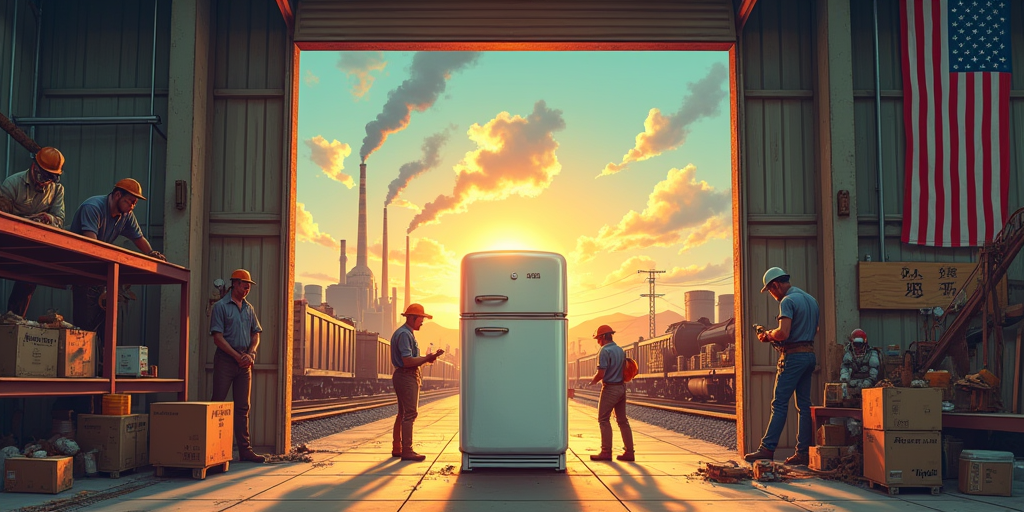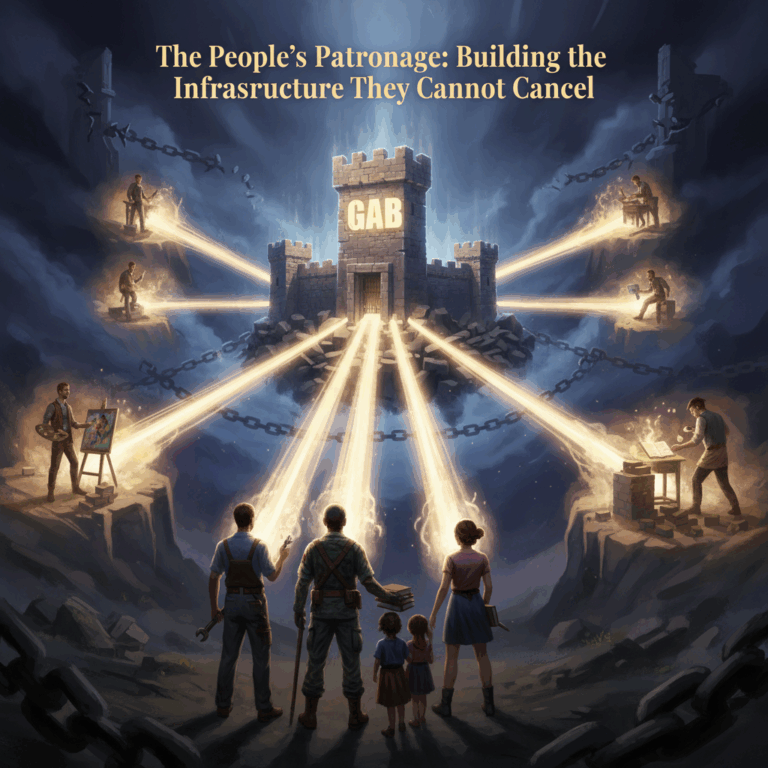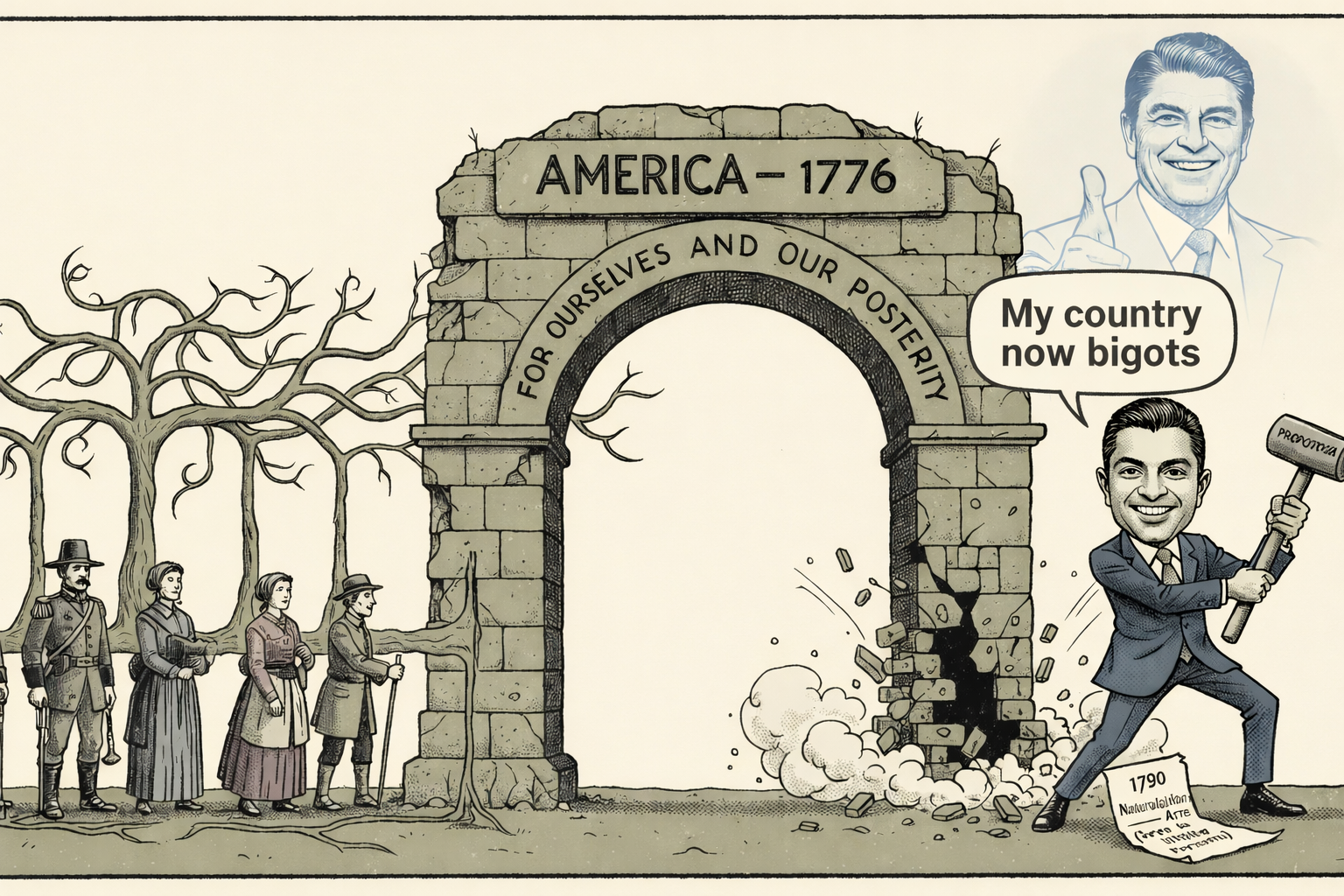The heart of America has always beat to the rhythm of hammers on steel, the hum of factories, and the pride of craftsmen shaping raw materials into something enduring. For too long, we’ve surrendered that heartbeat to the hollow clatter of foreign assembly lines. We traded our sovereignty, our dignity, and the well-being of our people for the fleeting convenience of cheaply made trinkets. But now, with tariffs reshaping the economic landscape, we stand at the threshold of a rebirth—a return to the essence of what made this nation unstoppable. This isn’t just about economics; it’s about resurrecting the soul of America.
Let’s be clear: the decay of American manufacturing didn’t happen by accident. It was a slow-motion betrayal. We outsourced our jobs, shuttered our factories, and handed over the keys to our prosperity to nations that don’t share our values or our dreams. My grandfather’s refrigerator, bought when he married my grandmother, still runs today. It wasn’t a fluke. It was built by American hands, forged with American steel, and engineered with the kind of pride that doesn’t cut corners. That fridge is a relic of an era when “Made in America” wasn’t a nostalgic slogan—it was a stamp of excellence. Today, we’re surrounded by disposable goods designed to break, replace, and drain our wallets. This isn’t progress. It’s a surrender.
Tariffs are not punishment. They’re a lifeline. By making it harder for foreign competitors to undercut our industries, we’re forcing a reckoning. Suddenly, it’s no longer cheaper to ship jobs overseas. Suddenly, companies that abandoned our heartland for foreign sweatshops will have no choice but to come home. This is how we rebuild. This is how we stop the bleeding. Critics will whine about “trade wars” or “higher prices,” but what’s the alternative? A nation of consumers, not creators? A people stripped of purpose, staring at screens, ordering plastic junk from faceless corporations overseas? That’s not a future. That’s a death spiral.
American men and women are starving for purpose. We weren’t born to click “Add to Cart” and wait for delivery trucks. We were born to invent, to engineer, to sweat over a weld until it’s perfect. The pioneer spirit that carved railroads across mountains and raised skyscrapers into the sky hasn’t vanished—it’s been suffocated by a culture that tells us building things is someone else’s job. Tariffs are the spark that reignites that fire. When factories reopen, when workshops hum back to life, we won’t just be manufacturing goods. We’ll be restoring dignity. Every job created here, every product stamped “Made in USA,” is a middle finger to the lie that America’s best days are behind her.
This is about more than economics. It’s about identity. For decades, we’ve been force-fed the myth that globalization is inevitable, that competition with countries exploiting their workers and polluting their rivers is “fair.” But since when did Americans settle for “fair” when we could strive for dominance? Our ancestors didn’t cross oceans and plains to become passive observers of their own destiny. They built. They fought. They innovated. Tariffs are the first step in rejecting the cowardice of offshoring and embracing the courage of self-reliance.
The road ahead won’t be easy. There will be short-term costs. But since when did greatness come without sacrifice? The naysayers can keep their flimsy gadgets and their fragile supply chains. We’ll take the struggle of rebuilding, because on the other side of that struggle is a nation that makes things again—things that last. A nation where fathers and mothers point to bridges, engines, and yes, refrigerators, and say, “We built that.” A nation where the American spirit, too long caged by complacency, finally breaks free.
This is our moment. The tariffs are more than policy—they’re a declaration. We are done outsourcing our future. We are done surrendering our pride. Let the world call it protectionism. We’ll call it patriotism. The golden age of American building begins now.
The skeptics love to preach about the “global economy” as if it’s some sacred, unalterable force of nature. But let’s strip away the euphemisms. What they call “globalization” is really just a race to the bottom—a system that rewards countries for exploiting laborers, gutting environmental standards, and hollowing out the industries of their so-called “partners.” America didn’t become a superpower by bowing to such extortion. We became a superpower by outworking, outthinking, and outbuilding everyone else. Tariffs level the playing field, yes, but their greater purpose is to remind the world that America doesn’t follow rules—we set them. This isn’t isolationism; it’s defiance. We’re done playing the sucker in a rigged game.
Consider the small towns and cities scattered across the Rust Belt, the South, and the heartland. These communities weren’t just clusters of factories; they were ecosystems of innovation and pride. When the factories left, they took more than jobs. They took identity. They took the Friday night camaraderie of workers sharing a beer after a hard week, the local diners buzzing with shifts changing, the scholarships funded by plant profits for kids to learn trades. Tariffs won’t just revive factories—they’ll revive the glue that holds these towns together. This isn’t nostalgia. It’s justice. For every Main Street boarded up, for every family fractured by addiction or despair in the wake of economic collapse, tariffs are a down payment on redemption.
And let’s talk about the men and women who’ve been told their skills are obsolete. The welders, machinists, and electricians—the ones who don’t just push buttons but solve problems with calloused hands and sharp minds. These aren’t “old economy” jobs. They’re timeless trades, the backbone of any society that values self-reliance. Tariffs will force us to reinvest in apprenticeships, in vocational schools, in the kind of hands-on education that doesn’t saddle kids with debt but instead gifts them purpose. Imagine a generation raised not on influencers peddling vanity, but on mentors teaching them to measure twice and cut once. That’s how cultures endure. That’s how legacies are forged.
Detractors screech about inflation, but they ignore the hidden costs of our current decay. Yes, a $10 toaster from overseas is cheap—until you factor in the billions spent on welfare for displaced workers, the opioid crisis fueled by joblessness, or the national security risks of relying on China for everything from microchips to antibiotics. What’s more expensive: paying a fair price for a toaster built in Ohio, or surrendering our resilience as a nation? Tariffs force us to confront these truths. They’re not a tax on consumers; they’re an investment in sovereignty. When we build our own goods, control our own supply chains, and employ our own people, we’re not just saving money—we’re saving ourselves.
Some will say automation renders this vision outdated. Nonsense. Automation isn’t the enemy; offshoring is. Imagine combining American ingenuity, robotics, and high-tech manufacturing with the grit of our workforce. We’d dominate. Germany didn’t abandon its factories—it married precision engineering with cutting-edge tech. Japan didn’t outsource its auto industry—it perfected it. America can do both, but only if we have the courage to protect and nurture our industrial base first. Tariffs buy us time to innovate here, on our soil, rather than handing our future to rivals.
This is also a spiritual battle. Consumerism has turned us into a nation of renters—of our gadgets, our homes, even our identities. We scroll, we swipe, we discard. But building things changes you. It roots you. There’s a reason our grandfathers held onto that fridge for 60 years: it was a testament to their values. Durability. Integrity. Legacy. When we build again, we’re not just making products—we’re making prophets of a forgotten creed. Every steel beam, every engine, every circuit board crafted here becomes a sermon: We refuse to rot. We choose to create.
The road ahead demands more than tariffs, of course. We’ll need to slash regulations that strangle small manufacturers, rewrite trade deals that put America first, and celebrate blue-collar work as noble, not “backup” career. But tariffs are the catalyst. They’re the spark in the dark, the signal to the world that America is done outsourcing its soul. For every CEO who claims he “has no choice” but to move jobs overseas, tariffs scream back: You do now.
History doesn’t remember nations for what they bought. It remembers them for what they built. The pyramids. The railroads. The internet. Our ancestors didn’t cling to safe, small, soulless lives—they gambled on greatness. Tariffs are our gamble. They’re a bet that American hands still yearn to shape steel, that American hearts still hunger for purpose, and that this country’s best chapters aren’t behind her, but waiting to be written. Let the doubters cling to their cheap trinkets.
We’re building cathedrals.
Andrew Torba
CEO, Gab AI Inc
Christ is King





